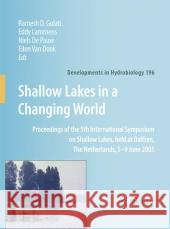Shallow Lakes in a Changing World: Proceedings of the 5th International Symposium on Shallow Lakes, Held at Dalfsen, the Netherlands, 5-9 June 2005 » książka
Shallow Lakes in a Changing World: Proceedings of the 5th International Symposium on Shallow Lakes, Held at Dalfsen, the Netherlands, 5-9 June 2005
ISBN-13: 9789048176267 / Angielski / Miękka / 2010 / 466 str.
Shallow Lakes in a Changing World: Proceedings of the 5th International Symposium on Shallow Lakes, Held at Dalfsen, the Netherlands, 5-9 June 2005
ISBN-13: 9789048176267 / Angielski / Miękka / 2010 / 466 str.
(netto: 768,56 VAT: 5%)
Najniższa cena z 30 dni: 771,08
ok. 22 dni roboczych.
Darmowa dostawa!
which method/approach to take for the deter- nation of reference conditions is dependent on The estimation of reference conditions is crucial the condition of the sites available for a certain in any ecological assessment programme (e. g. lake type: (a) where undisturbed or nearly undis- Moss et al., 1996). These provide the baseline turbed conditions prevail, a validated spatial from which to determine lake change with time, network is preferred; (b) if degraded conditions and are necessary to evaluate a lake s current prevail then the preferred modelling approach status or potential for change. would be based on establishing a good relation- The most recent European water legislation, ship between stress and ecological response; (c) the water framework directive (WFD), prescribes expert judgement should be used as the last resort the assessment of ecological quality of surface and be accompanied by an acceptable validation waters using an ecological quality ratio (EQR). process. The EQR is de?ned as the ratio between the The TP status of a lake is mainly determined reference value and the observed value for a by its external nutrient supply. Phosphorus export given metric. from a catchment in an undisturbed area will As part of the assessment of ecological quality, depend on the natural fertility of the local rocks many European countries are choosing to devel- or glacial deposits, and the soils derived from op a quality classi?cation scheme for total ph- them."











